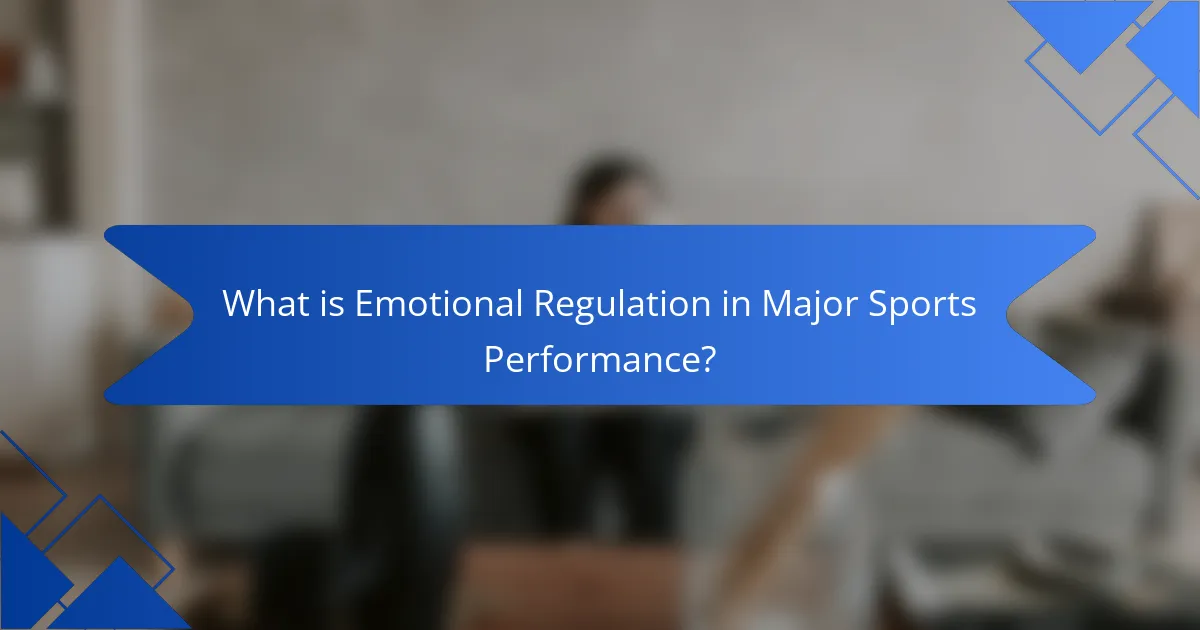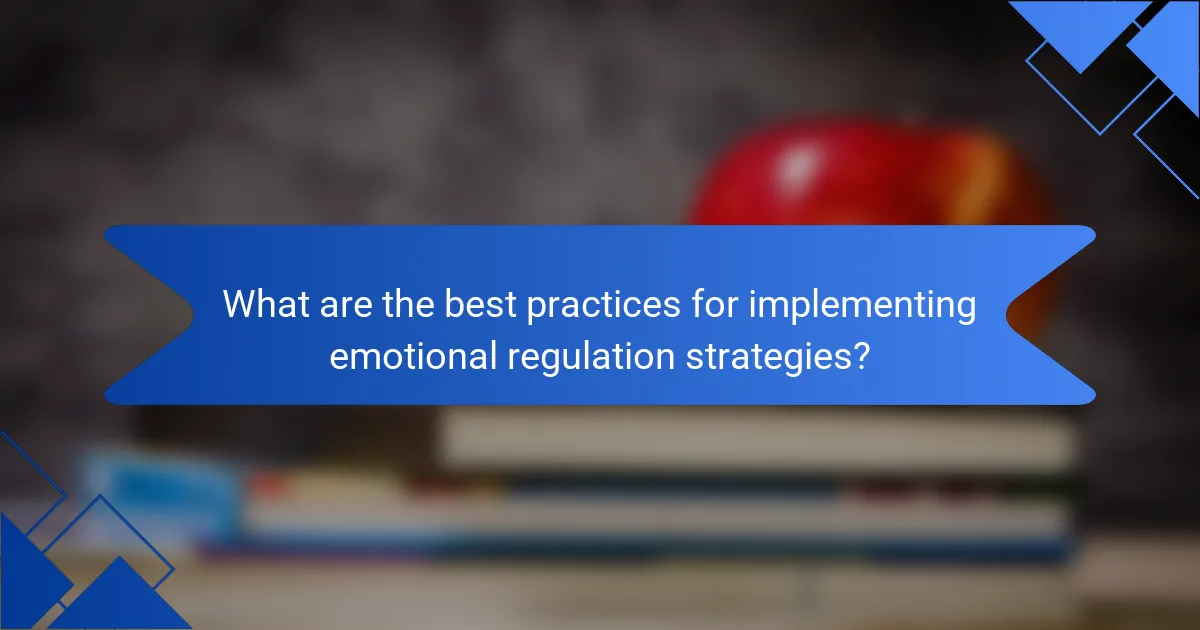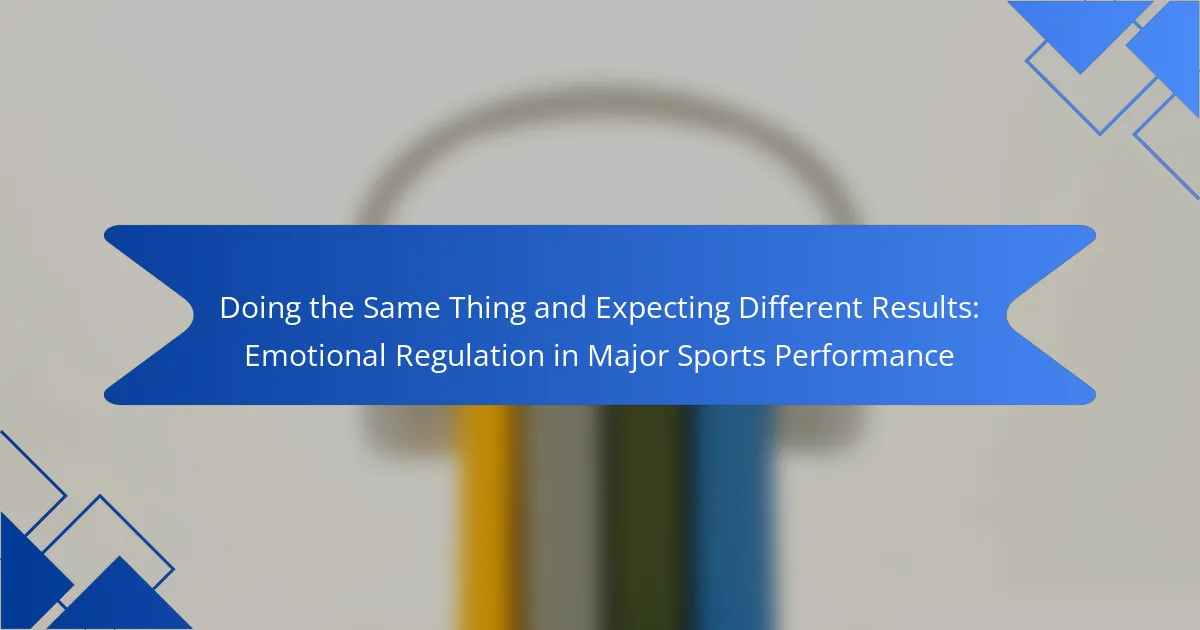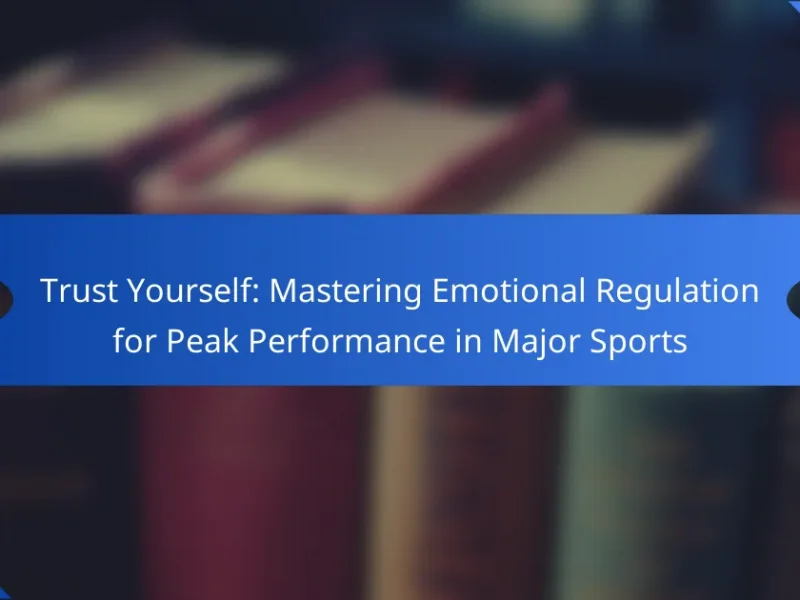Emotional regulation is essential for athletes aiming to optimize their performance in major sports. This article explores how effective emotional management enhances focus, reduces anxiety, and improves decision-making. It examines the flexibility and awareness required for emotional regulation, highlights unique and rare attributes that differentiate athlete strategies, and discusses practical practices like mindfulness and coping mechanisms that contribute to better performance outcomes.

What is Emotional Regulation in Major Sports Performance?
Emotional regulation is crucial for optimizing performance in major sports. Athletes who effectively manage their emotions can enhance focus, reduce anxiety, and improve decision-making. This skill involves recognizing emotional triggers and employing strategies to maintain composure under pressure. Research indicates that athletes with strong emotional regulation tend to achieve higher performance levels, demonstrating its unique role in competitive success.
How does emotional regulation impact athletic performance?
Emotional regulation significantly enhances athletic performance by improving focus and resilience. Athletes who effectively manage their emotions can maintain composure under pressure, leading to better decision-making and execution of skills. Research shows that emotional regulation strategies, such as mindfulness and cognitive reappraisal, can reduce anxiety and increase confidence during competitions. This results in more consistent performance outcomes and the ability to adapt to challenging situations. Ultimately, emotional regulation serves as a unique attribute that distinguishes high-performing athletes from their peers.
What are the common emotional challenges faced by athletes?
Athletes commonly face emotional challenges such as anxiety, pressure, burnout, and self-doubt. These issues can significantly impact performance and mental health. For example, anxiety may arise from high expectations, while burnout can result from prolonged training without adequate recovery. Self-doubt can diminish confidence and hinder performance. Addressing these emotional challenges is crucial for maintaining peak performance in major sports.

What are the universal attributes of emotional regulation systems?
Emotional regulation systems universally exhibit flexibility, awareness, and strategies for managing emotions. These attributes enable athletes to maintain focus and performance under pressure. Flexibility allows adaptation to changing circumstances, while awareness involves recognizing emotional states. Effective strategies include cognitive reappraisal and mindfulness, which enhance emotional control and decision-making.
How do emotional regulation systems function in team sports?
Emotional regulation systems in team sports help athletes manage their emotions to enhance performance. These systems function through various mechanisms, including self-awareness, emotional expression, and social support.
Athletes often utilize self-regulation techniques, such as mindfulness and cognitive restructuring, to control emotional responses during competition. This ability to manage anxiety and frustration can lead to improved focus and decision-making on the field.
Additionally, team dynamics play a crucial role in emotional regulation. Supportive relationships among teammates foster an environment where players feel safe to express emotions, which can enhance collective performance.
Research indicates that effective emotional regulation correlates with higher levels of team cohesion and success in major sports. Teams that prioritize emotional intelligence training often experience better outcomes in high-pressure situations.
What role does emotional awareness play in performance?
Emotional awareness is crucial for enhancing performance in major sports. It allows athletes to recognize and manage their emotions, leading to better focus and decision-making. Athletes with high emotional awareness can adapt their strategies based on emotional states, which is a unique attribute that contributes to improved outcomes. For instance, understanding anxiety can help in developing coping mechanisms, ultimately enhancing performance consistency. Emotional regulation techniques, such as mindfulness, further empower athletes to maintain composure under pressure, significantly impacting their ability to perform at peak levels.
What techniques enhance emotional awareness?
Practicing mindfulness, journaling emotions, and seeking feedback enhance emotional awareness. These techniques promote self-reflection and understanding in sports performance. Mindfulness helps athletes stay present, while journaling captures emotional responses. Feedback from coaches provides external perspectives, aiding in emotional regulation.

What unique attributes differentiate emotional regulation systems in sports?
Unique attributes that differentiate emotional regulation systems in sports include adaptability, context sensitivity, and athlete-specific strategies. Adaptability allows athletes to modify their emotional responses based on situational demands. Context sensitivity ensures that emotional regulation aligns with the unique pressures of specific sports environments. Athlete-specific strategies highlight personalized approaches, catering to individual psychological profiles and experiences. These attributes collectively enhance performance by optimizing emotional responses during competition.
How do individual sports require distinct emotional regulation strategies?
Individual sports require tailored emotional regulation strategies due to their unique competitive environments. Athletes in individual sports often face heightened pressure, leading to distinct emotional challenges. For instance, a tennis player must manage anxiety during match points, while a swimmer might deal with the solitude of training.
These nuances necessitate specific strategies, such as visualization techniques for focus and mindfulness practices to enhance emotional resilience. Individual sports often lack team support, making self-regulation critical for performance. Research indicates that athletes who effectively employ emotional regulation strategies experience improved outcomes and overall satisfaction in their sport.
What are the psychological techniques used by elite athletes?
Elite athletes use various psychological techniques for emotional regulation to enhance performance. These techniques include visualization, self-talk, mindfulness, and goal-setting.
Visualization helps athletes mentally rehearse their performance, creating a positive mindset. Self-talk involves using affirmations to boost confidence and reduce anxiety. Mindfulness techniques promote focus and present-moment awareness, aiding in stress management. Goal-setting establishes clear objectives, providing motivation and direction.
These techniques are essential for maintaining composure under pressure and achieving optimal performance in major sports.
How does visualization aid emotional regulation?
Visualization enhances emotional regulation by providing athletes with a mental framework to manage stress and anxiety. This technique allows individuals to rehearse performance scenarios, leading to increased confidence and focus. Research indicates that visualizing successful outcomes can activate neural pathways similar to actual performance, reinforcing positive emotional states. Furthermore, visualization can help athletes develop coping strategies for high-pressure situations, ultimately improving their overall performance.

What rare attributes exist within emotional regulation practices?
Emotional regulation practices in major sports performance include rare attributes that enhance effectiveness. These attributes may encompass unique techniques like visualization, biofeedback, or mindfulness integration. Each of these methods provides distinct advantages, such as improved focus, reduced anxiety, and enhanced resilience under pressure. For instance, biofeedback allows athletes to monitor physiological responses, enabling real-time adjustments to emotional states. Such rare attributes contribute significantly to achieving optimal performance outcomes.
What uncommon emotional regulation techniques have shown success?
Uncommon emotional regulation techniques that have shown success include visualization, mindfulness meditation, and expressive writing. These methods enhance athletes’ emotional resilience and performance under pressure. Visualization allows athletes to mentally rehearse scenarios, improving focus and reducing anxiety. Mindfulness meditation promotes present-moment awareness, helping to manage stress and enhance emotional control. Expressive writing provides a safe outlet for emotions, facilitating better emotional processing and reducing performance-related anxiety. These unique attributes contribute to improved mental states, leading to enhanced sports performance.
How do cultural backgrounds influence emotional regulation in sports?
Cultural backgrounds significantly shape emotional regulation in sports by influencing athletes’ coping mechanisms and responses to stress. Different cultures emphasize distinct emotional expressions and management strategies. For example, collectivist cultures may promote emotional restraint, while individualistic cultures may encourage open expression. This cultural lens affects athletes’ performance under pressure and their interactions with teammates. Research indicates that cultural norms can impact resilience and adaptability, key components of effective emotional regulation in competitive environments. Understanding these differences can enhance team dynamics and performance outcomes.

What are the best practices for implementing emotional regulation strategies?
To implement emotional regulation strategies effectively, athletes should practice mindfulness, develop coping mechanisms, and establish routines. Mindfulness enhances self-awareness, allowing athletes to recognize emotional triggers. Coping mechanisms, such as deep breathing or visualization, provide immediate relief during high-pressure situations. Establishing consistent pre-performance routines fosters emotional stability, preparing athletes mentally for competition. These practices contribute to improved focus and performance outcomes in major sports.
How can coaches support athletes in developing emotional regulation skills?
Coaches can significantly enhance athletes’ emotional regulation skills through structured support and training. They should implement strategies like mindfulness techniques, fostering open communication, and providing consistent feedback.
Mindfulness practices help athletes become aware of their emotions, allowing them to respond rather than react. Open communication creates a safe environment for athletes to express their feelings, which is crucial for emotional growth. Consistent feedback helps athletes recognize patterns in their emotional responses, enabling them to develop coping strategies.
Additionally, coaches can model emotional regulation themselves, demonstrating how to handle stress and setbacks effectively. This unique attribute of leading by example reinforces the importance of emotional management in sports performance.
By integrating these approaches, coaches can cultivate an environment that promotes emotional resilience, ultimately enhancing athletes’ performance and well-being.
What common mistakes should athletes avoid in emotional regulation?
Athletes should avoid the mistake of relying on outdated emotional regulation techniques. Sticking to ineffective strategies can hinder performance and lead to frustration. Another common error is neglecting self-awareness, which is crucial for recognizing emotional triggers. Failing to adapt emotional responses to varying situations can also impair focus and decision-making. Lastly, overlooking the importance of mental recovery can result in burnout and decreased resilience.
What are expert insights on emotional regulation in major sports?
Emotional regulation is crucial for peak performance in major sports, influencing athletes’ ability to manage stress and maintain focus. Expert insights highlight the importance of mental training techniques, such as mindfulness and cognitive restructuring, to enhance emotional control. These strategies help athletes respond to challenges with resilience, ultimately improving performance outcomes. Research shows that athletes who effectively regulate their emotions often achieve higher levels of success and satisfaction in their sports. Additionally, integrating emotional regulation training into regular practice routines can lead to significant improvements in overall performance consistency.


